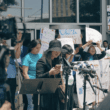This is part seven of The Yappie’s 2019 D.C. AAPI Intern Guide.
Overview
- Washington, D.C., is a highly complex urban center. If you are unfamiliar with the area, there are precautions that you can take in different contexts.
- I want to emphasize that D.C. is an extremely safe city with a low crime rate. If you follow some general, common-sense guidelines, you should feel secure.
- Areas of interest: Major tourist (the National Mall and its surroundings) and college areas (Georgetown, Foggy Bottom), Chinatown, and the North West neighborhoods are very safe. These areas have a visible police presence, and institutions such as the Capitol and the White House have their own protection. In terms of places to be more cautious, the Columbia Heights area comes to mind (I’ve heard this several times, and I also lived in an Airbnb in the area last year).
General Tips
- Sign up for emergency alerts at hsema.dc.gov/page/alertdc.
- Always be prepared — use common sense: Keep your phone charged in case of emergencies (if you don’t have a rechargeable battery pack, now is a good time to get one). Have your key ready before you reach your door. Download a map app that you can use offline. Always have enough cash to get you where you need to go. Don’t stumble around drunk or flaunt your valuables.
- Don’t act like a tourist: Look like you know what you’re doing. This may be hard at first, but the more confused you appear and the slower you walk, the more you could be a target. Walk with almost athletic confidence (fake it if you can) and try to blend in with everyone else in public. Try not to stop and talk to strangers.
- Don’t wear headphones or earbuds in public: This isn’t a college environment, and you could miss what’s going on around you — especially fast-approaching cars.
- If you are the victim of a crime or see a crime in progress, always call 9–1–1: If you are being robbed and a visible weapon is involved, DO NOT RESIST.
Safety at Work
- Allow extra time for security screenings: Many buildings in D.C. have security protocols that may delay your entry.
- Don’t bring any valuables: Keep electronics secured in a bag that you can keep a tight grip on. If you do have valuables, keep them locked up or in a safe place.
- Don’t stay late in the office alone if you can: If you do leave late, walk with a coworker or security guard.
- At networking receptions and bars: If you are in a group setting where you don’t know everyone, don’t advertise that you need a drink.
- Note: If you are in a government internship, take steps to avoid all protests or major public events when traveling to or from work. Be wary of signing in-person petitions — while most are legitimate and you may agree with the cause, it still poses a potential security risk.
Safety on the Metro
- Metro stations are patrolled regularly by police and the National Guard, and there is at least one staff member at each station. However, there is still a risk of pickpocketing — particularly phone and electronic theft — when a station is crowded.
- Always keep an eye on your belongings: Store any valuable items out of view and keep your cell phone and wallet close to your body where you can feel them. Always keep one hand on your bag (I suggest placing it on your lap where you can see it). It is also preferable to sit closer to the center of a metro car than to the sides, in case an attempted theft does occur.
- Suggestions for men: According to D.C. police, the target areas are back trouser pockets and suitcoats. Keep your wallet and ID in your front pocket or buttoned/zippered pockets. Don’t pat your pocket to see if your wallet is there — reach slowly to feel it instead.
- Suggestions for women: D.C. police recommend that you not carry your wallet in your purse. Instead, conceal it in a buttoned/zippered pocket. If you need to put your wallet in your purse, use a purse that is difficult to open, with zippers or snaps
- Bags: If you’re carrying a handbag, hold it close to your body instead of on your wrist or loose in your hand. For shoulder bags and purses, carry them diagonally across your body instead of on your shoulder, keeping the purse in front of you.
Safety at Night
- It is legal to possess self-defense sprays in D.C. (pepper spray): Keep in mind that D.C. code states that self-defense sprays “must be propelled from an aerosol container.”
- Don’t travel alone: If you are nervous or worried, you should always travel in the company of fellow interns or friends. Get directions before heading out and be aware of your surroundings. Stay wary of poorly-lit and isolated areas and avoid dark alleys and empty streets. If something doesn’t feel right, do what you need to do in order to feel more comfortable (crossing the street, or avoiding someone).
- Inform others: Tell someone — a friend, family member, security person, etc. — where you are heading before you leave, the method of transportation (if not walking), and how long you will likely be gone for. Check in with them when you return or leave instructions to contact police if they don’t hear from you by a certain time.
- If you think you’re being followed, DO NOT GO HOME. Instead, do your best to head to a well-lit and crowded area — restaurants, stores, anywhere you can to ask for help.
Sexual Assault
- Advice from D.C. police: “Try to escape. Scream. Be rude. Make noise to discourage your attacker from following. If you’re wearing heels and want to run, ditch the shoes, and assess your options.”
- “If the assailant has a weapon, you may have no choice but to submit. Do whatever it takes to survive. If you decide to fight back, you must be quick, determined and effective. Target the eyes or groin.”
- D.C. Rape Crisis Center: (202) 333–7273. Resources are available here.
Ridesharing App Safety
- Prior to your trip: Check your driver’s rating. If something doesn’t seem right, cancel the trip and hail another driver. Let someone know you are making a trip and tell them where you’re going. Some apps also include emergency buttons — make sure you know where to locate them.
- Confirm your driver before getting in: Ask for the driver’s name, and ask, “Who are you here for?” Cross-check the license plate with the number on your app before you get in the car.
- During your trip: Don’t give the driver your phone number or reveal any personal information, if possible. If you sense trouble, dial 9–1–1.










